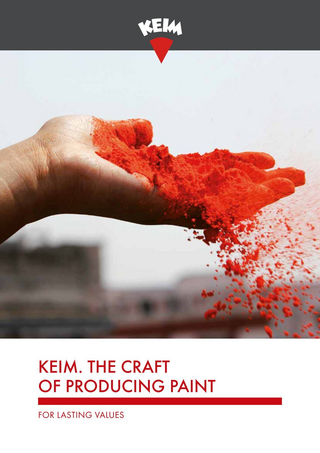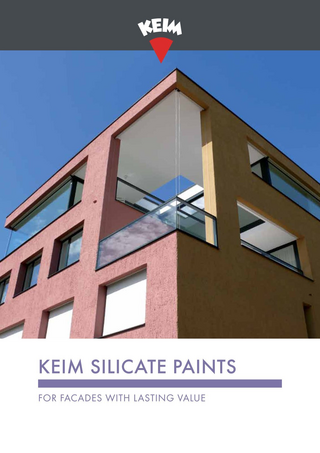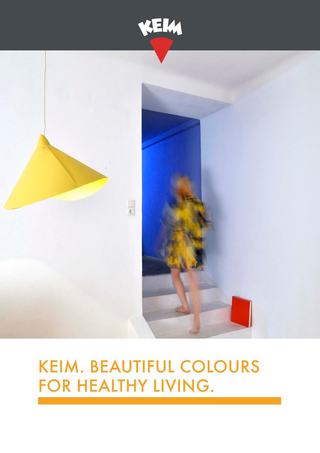KEIM silicate paints - the mineral principle
There are great differences between eco friendly, sustainable paints and conventional paints. The characteristics profile of a paint depends essentially on its "inner values", in other words, its composition of binder, pigments, fillers and additives.
There are great differences between eco friendly, sustainable paints and conventional paints. The characteristics profile of a paint depends essentially on its "inner values", in other words, its composition of binder, pigments, fillers and additives.
Not all paints are the same
Paints change when exposed to UV light and other external influences: wood goes dark or grey, and coatings on facades can fade. Fading can be avoided: environmentally friendly paints by KEIM contain only lightfast, inorganic pigments and mineral binding agents such as potassium silicate or sol-silicate. Potassium silicate is extremely weather-resistant. In comparison to conventional paints, the inorganic pigments in KEIM silicate paints are not enclosed in a film but exposed directly to the rays of light. The colour shades shine directly out of the velvety matt surface, revealing an amazing, durable depth and high brilliance.
Guaranteed!
KEIM facades remain the same, even over decades.
Potassium silicate – the silicate paint binder with an ingenious adhesion principle
The most important ingredient influencing the quality of a paint is the binder. It is responsible for adhesion, weathering protection, breathability and durability as well as protection of the lightfast pigments. The binder is also responsible for many of the paint's properties and determines the length of the renovation cycle of a facade. Paints with mineral binders offer an advantage in this respect. A distinction may be drawn between two groups of binders: mineral binders (=inorganic) (e.g. water glass or potassium water glass) and organic binders (such as synthetic resin emulsions or silicone resin emulsions). The main difference is the principle of adhesion: mineral binders react chemically with the substrate, whilst organic binders adhere only by "adhesive bonding".
It is the binder in particular that divides the world of paints into two fundamental directions: mineral and petrochemical technology. The latter uses binders based on polymers, i.e. plastics, which are produced from crude oil in energy-consuming synthesis processes. These "organic" binder particles are the core of emulsion paints or silicone resin paints. After drying, they form a more or less impervious paint film on the surface.
Pigments give paint its colour
(Colour) Pigments are very fine, extremely chromophoric powders. The addition of pigments imparts colour to coating materials. Pigments are also divided into inorganic (= mineral) and organic types:
Inorganic pigments are obtained from inorganic raw materials (minerals), while organic pigments are mainly manufactured from organic raw materials.
The mineral pigments in our silicate, eco friendly paints and colour washes are extremely colour-stable, light reflecting and do not fade.
Fillers and additives are important helpers
Fillers usually consist of rock flour. These fillers make the layer of applied paint thick enough to protect the facade from weathering.
Most paints also contain so-called additives. Additives are auxiliary substances for adjusting various paint properties (such as water repellency or consistency).
The principle of silicate technology is based on silicification of the binder with the substrate – a chemical process during which the waterglass of the potassium silicate binder reacts with the mineral substrate. Silicification results in a secure, insoluble bond between the paint and the underlying substrate (render, natural stone, concrete etc.). The render cross-section (shown on the right) shows the silicification process using dyed KEIM Fixativ (liquid potassium silicate). This bond is crucial for the unrivalled high durability of KEIM silicate interior and exterior paints.
KEIM silicate paints – properties, advantages and benefits
It was in 1878 that Adolf Wilhelm Keim was issued the patent for the innovative composition of his mineral paints which is still in use today. KEIM mineral paints have a completely mineral basis, making them eco friendly, breathable and low VOC. The "waterglass" binder is a silicate that forms a chemical bond with mineral substrates such as stone, render and concrete. The result is an extremely durable bond between the substrate and wall paint or facade paint, which is far more resistant than the purely superficial adhesion of conventional paints.
Ecology
Sustainable building and renovating make an important contribution towards a better future and protect the environment. There are huge ecological advantages in the mineral product composition of silicate paints made by KEIM. Due to the potassium silicate binder, silicate paints can be made without using any preservation agents, solvents and plasticisers. Our paints for interior use therefore ensure an optimum indoor climate and healthier homes; making them child safe, and allergy friendly.

Economic efficiency of silicate paints
The perceived money saving from using cheaper paint materials can lead to much more expensive consequences in the long term, (frequency of re-painting and lesser durability) whereas choosing quality from the onset is often the better and more affordable and cost effective solution.







